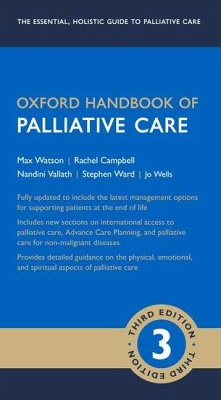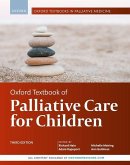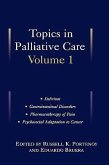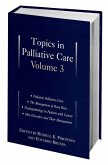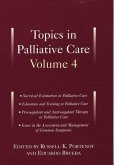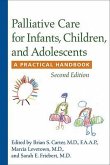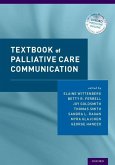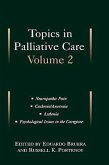Oxford Handbook of Palliative Care
Herausgeber: Watson, Max; Campbell, Rachel; Wells, Jo; Vallath, Nandini; Ward, Stephen
Oxford Handbook of Palliative Care
Herausgeber: Watson, Max; Campbell, Rachel; Wells, Jo; Vallath, Nandini; Ward, Stephen
- Broschiertes Buch
- Merkliste
- Auf die Merkliste
- Bewerten Bewerten
- Teilen
- Produkt teilen
- Produkterinnerung
- Produkterinnerung
The Oxford Handbook of Palliative Care is a concise, comprehensive guide to palliative care, covering all aspects from symptom relief to emotional and spiritual support for the patient and their family. Written to enable quick access to key information, this is the invaluable companion for those in the palliative care field.
Andere Kunden interessierten sich auch für
![Oxford Textbook of Palliative Care for Children Oxford Textbook of Palliative Care for Children]() Oxford Textbook of Palliative Care for Children200,99 €
Oxford Textbook of Palliative Care for Children200,99 €![Topics in Palliative Care Topics in Palliative Care]() Russell K. Portenoy / Eduardo Bruera (eds.)Topics in Palliative Care87,99 €
Russell K. Portenoy / Eduardo Bruera (eds.)Topics in Palliative Care87,99 €![Topics in Palliative Care Topics in Palliative Care]() Russell K. Portenoy / Eduardo Bruera (eds.)Topics in Palliative Care87,99 €
Russell K. Portenoy / Eduardo Bruera (eds.)Topics in Palliative Care87,99 €![Topics in Palliative Care Topics in Palliative Care]() Russell K. Portenoy / Eduardo Bruera (eds.)Topics in Palliative Care72,99 €
Russell K. Portenoy / Eduardo Bruera (eds.)Topics in Palliative Care72,99 €![Palliative Care for Infants, Children, and Adolescents Palliative Care for Infants, Children, and Adolescents]() Palliative Care for Infants, Children, and Adolescents87,99 €
Palliative Care for Infants, Children, and Adolescents87,99 €![Textbook of Palliative Care Communication Textbook of Palliative Care Communication]() Textbook of Palliative Care Communication177,99 €
Textbook of Palliative Care Communication177,99 €![Topics in Palliative Care Topics in Palliative Care]() Portenoy BrueraTopics in Palliative Care86,99 €
Portenoy BrueraTopics in Palliative Care86,99 €-
-
-
The Oxford Handbook of Palliative Care is a concise, comprehensive guide to palliative care, covering all aspects from symptom relief to emotional and spiritual support for the patient and their family. Written to enable quick access to key information, this is the invaluable companion for those in the palliative care field.
Hinweis: Dieser Artikel kann nur an eine deutsche Lieferadresse ausgeliefert werden.
Hinweis: Dieser Artikel kann nur an eine deutsche Lieferadresse ausgeliefert werden.
Produktdetails
- Produktdetails
- Verlag: Hurst & Co.
- 3rd edition
- Seitenzahl: 976
- Erscheinungstermin: 12. November 2019
- Englisch
- Abmessung: 185mm x 103mm x 40mm
- Gewicht: 486g
- ISBN-13: 9780198745655
- ISBN-10: 0198745656
- Artikelnr.: 55088758
- Herstellerkennzeichnung
- Libri GmbH
- Europaallee 1
- 36244 Bad Hersfeld
- gpsr@libri.de
- Verlag: Hurst & Co.
- 3rd edition
- Seitenzahl: 976
- Erscheinungstermin: 12. November 2019
- Englisch
- Abmessung: 185mm x 103mm x 40mm
- Gewicht: 486g
- ISBN-13: 9780198745655
- ISBN-10: 0198745656
- Artikelnr.: 55088758
- Herstellerkennzeichnung
- Libri GmbH
- Europaallee 1
- 36244 Bad Hersfeld
- gpsr@libri.de
Professor Max Watson is Director of Project ECHO at Hospice UK in London, former Medical Director of Northern Ireland Hospice, Honorary Senior Lecturer at Queens University Belfast, and Member of the Order of the British Empire (MBE) 2024, for services to Palliative Care Medicine. Rachel Campbell is a speciality trainee in palliative medicine at the Northern Ireland Medical and Dental Training Agency (NIMDTA), and was formerly was an ADEPT Fellow on the Clinical Leadership Fellow's Program. Nandini Vallath is a clinical consultant and director of projects at the Trivandum Institute of Palliative Sciences in India. She was awarded the 2015 Cancer Aid Society Palliative Care Award for Excellence and Leadership in the SAARC region. Nandini collaborates with NGOs and government officials to develop policies to improve palliative care, and has helped develop modules for palliative care at undergratudate and professional levels. Stephen Ward is a Teacher Practitioner Pharmacist in the Belfast Health and Social Care Trust. In addition to providing a clinical pharmacy service in the Royal Victoria Hospital, he has also developed a medication safety programme for final year medical students. Stephen studied pharmacy in Queen's University Belfast before working as a hospital pharmacist in Uganda. Following this, he worked as a clinical pharmacist in the Belfast Trust and Northern Ireland Hospice. His research interests include medical education, palliative care and respiratory medicine. Jo Wells is a Nurse Consultant at the Southern Adelaide Palliative Service in Australia, and was formerly a Support Services Co-ordinator at The Leukaemia Foundation, South Australia.
1: Ethical issues and the person in the patient
2: Communication in palliative care
3: Research in palliative care
4: Quality of life
5: Principles of drug use in palliative care
6: Oncology and palliative care
7: Palliative care and haematology
8: Pain management
9: Gastrointestinal symptoms
10: Respiratory symptoms
11: Genitourinary symptoms
12: Skin problems in palliative care
13: Neurological problems in advanced cancer
14: Palliation of head and neck cancer
15: Endocrine and metabolic complications of advanced cancer
16: Paediatrics
17: Heart failure
18: Renal failure
19: HIV and palliative care
20: Dementia and frailty
21: Palliative care in non-malignant neurological disease
22: Psychiatric symptoms in palliative care
23: Spiritual care
24: The contribution to palliative care of allied health professions
25: Complementary and alternative medicine
26: Population based end of life care
27: Hospital liaison
28: Palliative and end of life care for people with learning disabilities
29: Emergencies
30: Terminal phase
31: Bereavement
32: Self care for health professionals
33: Access to palliative care - international perspectives
34: Miscellaneous
2: Communication in palliative care
3: Research in palliative care
4: Quality of life
5: Principles of drug use in palliative care
6: Oncology and palliative care
7: Palliative care and haematology
8: Pain management
9: Gastrointestinal symptoms
10: Respiratory symptoms
11: Genitourinary symptoms
12: Skin problems in palliative care
13: Neurological problems in advanced cancer
14: Palliation of head and neck cancer
15: Endocrine and metabolic complications of advanced cancer
16: Paediatrics
17: Heart failure
18: Renal failure
19: HIV and palliative care
20: Dementia and frailty
21: Palliative care in non-malignant neurological disease
22: Psychiatric symptoms in palliative care
23: Spiritual care
24: The contribution to palliative care of allied health professions
25: Complementary and alternative medicine
26: Population based end of life care
27: Hospital liaison
28: Palliative and end of life care for people with learning disabilities
29: Emergencies
30: Terminal phase
31: Bereavement
32: Self care for health professionals
33: Access to palliative care - international perspectives
34: Miscellaneous
1: Ethical issues and the person in the patient
2: Communication in palliative care
3: Research in palliative care
4: Quality of life
5: Principles of drug use in palliative care
6: Oncology and palliative care
7: Palliative care and haematology
8: Pain management
9: Gastrointestinal symptoms
10: Respiratory symptoms
11: Genitourinary symptoms
12: Skin problems in palliative care
13: Neurological problems in advanced cancer
14: Palliation of head and neck cancer
15: Endocrine and metabolic complications of advanced cancer
16: Paediatrics
17: Heart failure
18: Renal failure
19: HIV and palliative care
20: Dementia and frailty
21: Palliative care in non-malignant neurological disease
22: Psychiatric symptoms in palliative care
23: Spiritual care
24: The contribution to palliative care of allied health professions
25: Complementary and alternative medicine
26: Population based end of life care
27: Hospital liaison
28: Palliative and end of life care for people with learning disabilities
29: Emergencies
30: Terminal phase
31: Bereavement
32: Self care for health professionals
33: Access to palliative care - international perspectives
34: Miscellaneous
2: Communication in palliative care
3: Research in palliative care
4: Quality of life
5: Principles of drug use in palliative care
6: Oncology and palliative care
7: Palliative care and haematology
8: Pain management
9: Gastrointestinal symptoms
10: Respiratory symptoms
11: Genitourinary symptoms
12: Skin problems in palliative care
13: Neurological problems in advanced cancer
14: Palliation of head and neck cancer
15: Endocrine and metabolic complications of advanced cancer
16: Paediatrics
17: Heart failure
18: Renal failure
19: HIV and palliative care
20: Dementia and frailty
21: Palliative care in non-malignant neurological disease
22: Psychiatric symptoms in palliative care
23: Spiritual care
24: The contribution to palliative care of allied health professions
25: Complementary and alternative medicine
26: Population based end of life care
27: Hospital liaison
28: Palliative and end of life care for people with learning disabilities
29: Emergencies
30: Terminal phase
31: Bereavement
32: Self care for health professionals
33: Access to palliative care - international perspectives
34: Miscellaneous

